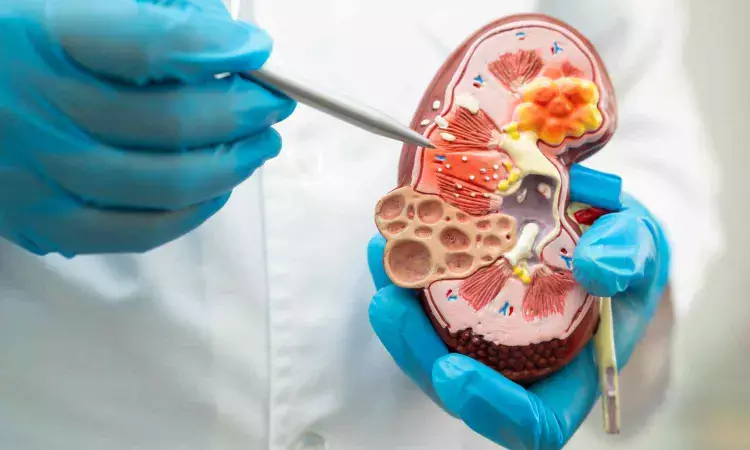- Home
- Medical news & Guidelines
- Anesthesiology
- Cardiology and CTVS
- Critical Care
- Dentistry
- Dermatology
- Diabetes and Endocrinology
- ENT
- Gastroenterology
- Medicine
- Nephrology
- Neurology
- Obstretics-Gynaecology
- Oncology
- Ophthalmology
- Orthopaedics
- Pediatrics-Neonatology
- Psychiatry
- Pulmonology
- Radiology
- Surgery
- Urology
- Laboratory Medicine
- Diet
- Nursing
- Paramedical
- Physiotherapy
- Health news
- Fact Check
- Bone Health Fact Check
- Brain Health Fact Check
- Cancer Related Fact Check
- Child Care Fact Check
- Dental and oral health fact check
- Diabetes and metabolic health fact check
- Diet and Nutrition Fact Check
- Eye and ENT Care Fact Check
- Fitness fact check
- Gut health fact check
- Heart health fact check
- Kidney health fact check
- Medical education fact check
- Men's health fact check
- Respiratory fact check
- Skin and hair care fact check
- Vaccine and Immunization fact check
- Women's health fact check
- AYUSH
- State News
- Andaman and Nicobar Islands
- Andhra Pradesh
- Arunachal Pradesh
- Assam
- Bihar
- Chandigarh
- Chattisgarh
- Dadra and Nagar Haveli
- Daman and Diu
- Delhi
- Goa
- Gujarat
- Haryana
- Himachal Pradesh
- Jammu & Kashmir
- Jharkhand
- Karnataka
- Kerala
- Ladakh
- Lakshadweep
- Madhya Pradesh
- Maharashtra
- Manipur
- Meghalaya
- Mizoram
- Nagaland
- Odisha
- Puducherry
- Punjab
- Rajasthan
- Sikkim
- Tamil Nadu
- Telangana
- Tripura
- Uttar Pradesh
- Uttrakhand
- West Bengal
- Medical Education
- Industry
Anakinra Plus Zinc May Cause More Kidney Damage in Severe Alcohol Hepatitis, Study Reveals

USA: A recent study has revealed concerning findings regarding the treatment of severe alcohol-associated hepatitis with anakinra plus zinc (A+Z). The research indicates that patients receiving this combination therapy experienced a higher frequency and severity of acute kidney injury (AKI) compared to those treated with prednisone.
"Those receiving A+Z who developed AKI exhibited elevated levels of urine-neutrophil-gelatinase-associated lipocalin, indicating that A+Z may have nephrotoxic effects in patients with severe alcohol-associated hepatitis," the researchers wrote in the journal Hepatology.
A recent trial had shown lower survival and higher acute kidney injury rates versus prednisone (PRED) in patients with severe alcohol-associated hepatitis treated with anakinra plus zinc. Kavish R. Patidar, Division of Gastroenterology and Hepatology, Department of Internal Medicine, Indiana University, Indianapolis, Indiana, USA, and colleagues characterized the clinical factors and potential mechanisms associated with AKI development in that trial.
For this purpose, the researchers analyzed data from 147 participants in a multicenter randomized clinical trial, with 74 receiving A+Z and 73 receiving PRED. They compared the incidence of acute kidney injury, AKI phenotypes, and kidney injury biomarkers between participants who developed AKI and those who did not in both treatment groups.
Multivariable competing risk analyses were conducted to identify baseline risk factors for incident AKI, treating death as a competing event. The factors considered included age, sex, mean arterial pressure (MAP), white blood cell count, albumin, MELD score, ascites, hepatic encephalopathy (HE), and treatment arm.
The following were the key findings of the study:
- At baseline, no participants had AKI; 33% (n=49) developed AKI during follow-up.
- AKI incidence was higher in A+Z than in PRED (45% versus 22%).
- AKI phenotypes were similar between the two treatment arms (p=0.361), but peak AKI severity was greater in A+Z than PRED (stage 3 63.6% versus 50.0%).
- At baseline, urine-neutrophil-gelatinase–associated lipocalin levels were similar among participants who developed AKI in both treatment arms.
- Day 7 and 14 urine-neutrophil-gelatinase–associated lipocalin levels increased significantly in participants treated with A+Z who developed AKI versus participants treated with PRED who developed AKI.
- On multivariable competing risk analysis, only A+Z was independently associated with incident AKI (subdistribution hazard ratio 2.35).
Study limitations include a lack of data necessary to fully understand the mechanism behind AKI.
The authors concluded that "the use of A+Z might have led to a decrease in MAP, which could have triggered acute tubular injury and contributed to higher mortality rates observed in the clinical trial comparing A+Z to prednisone for severe alcohol-associated hepatitis."
Reference:
Patidar, Kavish R.1,2; Tu, Wanzhu3; Cotter, Thomas G.4; Simonetto, Douglas A.5; Asgharpour, Amon6; Jan, Muhammad Y.7; Tang, Qing3; Yu, Yunpeng3; Li, Yang3; Taiwo, Moyinoluwa8; Thevkar Nagesh, Prashanth9; Dasarathy, Srinivasan8; Kamath, Patrick S.5; McClain, Craig J.10; Chalasani, Naga1; Szabo, Gyongyi9; Bataller, Ramon11,12; Mitchell, Mack4; Mehal, Wajahat Z.13,14; Nagy, Laura E.15; Shah, Vijay H.5; Gawrieh, Samer1; Sanyal, Arun J.6; for The AlcHepNet Investigators. Acute kidney injury in severe alcohol-associated hepatitis treated with anakinra plus zinc or prednisone. Hepatology ():10.1097/HEP.0000000000001019, July 19, 2024. | DOI: 10.1097/HEP.0000000000001019
Dr Kamal Kant Kohli-MBBS, DTCD- a chest specialist with more than 30 years of practice and a flair for writing clinical articles, Dr Kamal Kant Kohli joined Medical Dialogues as a Chief Editor of Medical News. Besides writing articles, as an editor, he proofreads and verifies all the medical content published on Medical Dialogues including those coming from journals, studies,medical conferences,guidelines etc. Email: drkohli@medicaldialogues.in. Contact no. 011-43720751


